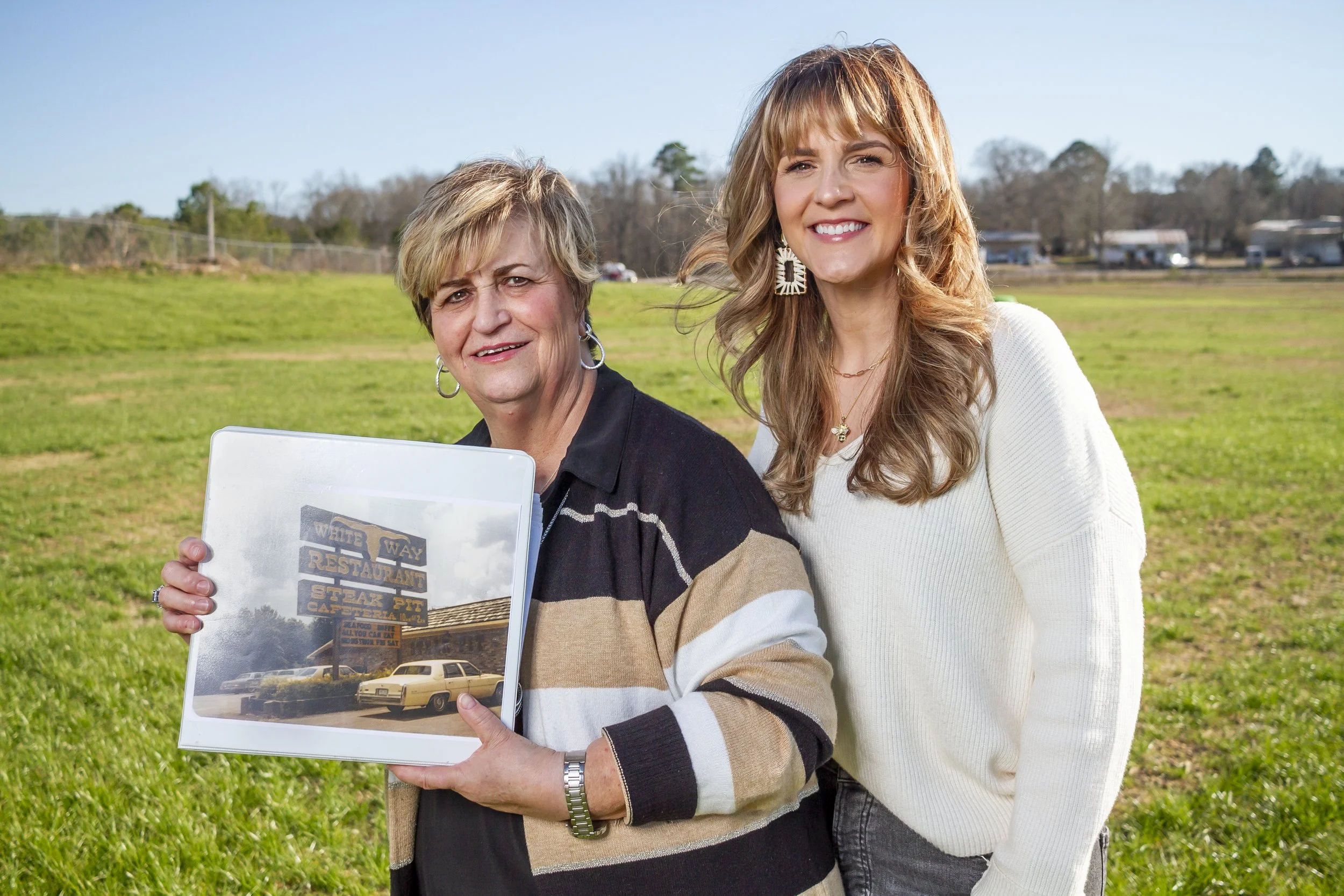Steaks, Sauce, and Southern Hospitality
The Moore family built a Jasper institution from the ground up.
Words by Micah Harrison | Images by Justin Hunter and courtesy of the Moore family
U.S. Highway 78 once ran as a four-lane road through Jasper, Alabama, before narrowing to two lanes at the eastern edge of the city. At night, floodlights illuminated the highway so brightly that people nicknamed it "Governor Patterson's White Way," after the governor who had them installed. When Ervin Moore built a restaurant at the eastern end of the four-lane stretch, naming it White Way Restaurant was an easy choice.
Ervin’s first venture into food service began in the mid-1940s when he was around 16 years old. He grew up in the town of Parrish and tested his entrepreneurial spirit there, setting up a makeshift grill beside the railroad tracks to sell sandwiches and hamburgers. During this time, he married his wife, Ruth, and the couple soon moved out of state. A few years later, ready to return home, they moved back to Jasper with their two children, Deb and Rusty. Once settled, Ervin decided to open a restaurant. He started by renting the café section of a Pan-Am service station on Birmingham Avenue in Jasper, launching the Pan-Am Café. After a few successful years, he bought the entire building, running the service station while Ruth managed the café.
A creative businessman, Ervin still dreamed of building his own restaurant. He searched for the perfect location and found it at the eastern end of Governor Patterson’s White Way. To fund the project, he bet everything he had, even selling his house and moving into a rental home and selling the Pan-Am service station and café to his in-laws. Even with the capital he raised, he still needed more funding. Banks, hesitant to finance a restaurant so far on the edge of town would not lend him money. His brother stepped in as a financial partner, investing the remaining funds needed. In March 1963, the White Way Restaurant opened its doors.
Serving breakfast, lunch, and supper, White Way Restaurant quickly became known for its soul food and Southern hospitality. Business grew so rapidly that just three years later, Ervin expanded the original structure, adding what would become the restaurant’s famous steak pit. During his travels to Panama City Beach, Florida, Ervin had often dined at Angelo’s Steak Pit, and he was inspired to incorporate a similar concept at his own restaurant. A refrigerated case displayed fresh-cut steaks for customers to choose from before watching them cook behind the glass-enclosed steak pit. These steaks were cooked over Alabama hickory wood and served on a sizzling hot platter. They were also always served with rosin potatoes—cooked in a vat of boiling pine rosin shipped from Georgia- giving them a distinctive woodsy flavor unique to the White Way.
Some patrons might remember the weekend seafood buffets that served fresh-bought seafood that Ervin sourced monthly from the Gulf. Others might remember the relish plates with green onions, black olives, bread and butter pickles, and cherry peppers. And those with a sweet tooth will certainly recall the homemade pies, topped with meringue that stood four inches high.
Perhaps the White Way’s most enduring legacy is its steak sauce. Originally known by the White Way name, it is now sold nationwide as Moore’s Steak Sauce. Like many great inventions, necessity sparked its creation. “He (Ervin) decided there wasn’t anything he liked to flavor his steaks with, so he thought he’d make up his own sauce,” Deb says. It took time to perfect, but eventually, Ervin developed the recipe that countless customers came to love.
From its opening in 1963 until a fire forced its closure in 1992, the White Way served as a community hub. Organizations such as the Rotary Club, Kiwanis Club, Civitan Club, and Lions Club held regular meetings in its dining rooms. During those years, Ruth also turned the restaurant into a benefactor of the Eldridge Children's Home. The White Way hosted an annual yard sale, with all proceeds benefiting the home. It also funded an annual Christmas event, where Ruth made sure every child received a new outfit, a toy, and a little spending money. “That just made Christmas as far as I was concerned… seeing all their faces light up and how excited they would be,” Deb Moore Jenkins recalls.
Though the building is long gone, memories of the White Way Restaurant remain strong. Many former customers still fondly recall Ruth greeting them in the lobby or Ervin refilling their coffee and ensuring their steak was cooked just right. And for those who worked there, the regulars
became more than just customers. “We got to know all of them on a first-name basis, all the regulars,” Deb says. “They were like family members to us because they were there all the time… Mama and Daddy treated everyone like they were at our house.” 78
(L-R) Deb Moore Jenkins and her daughter Michael-Anne Green


